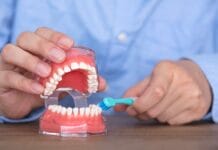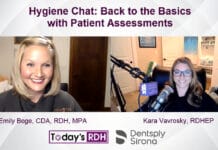Note: This is Part 4 of Debbi Viger’s series, Special Needs: Everyone Has Special Needs. Read Part 1 here, Part 2 here, and Part 3 here.
Every patient who sits in our chair has preconceived notions of what is right and what is wrong. Some patients feel that chemicals are evil, toothpaste is potentially life-threatening, and a fluoride treatment is not on the treatment agenda. The great fluoride debate.
As hygienists, we know fluoride varnish is beneficial. We know it can reduce decay and sensitivity in a simple, quick way that lasts. We know we can apply fluoride varnish as soon as the first tooth erupts, hopefully warding off decay for a lifetime. As much as it may be ingrained in every part of our hygienist-being that perhaps fluoride varnish is the greatest invention ever, we have got to let it go. Flat out, not every patient wants fluoride, believes in the benefits of fluoride or wants to pay for it. Educate, then let it go!
Unfortunately, some patients only know “Dr. Internet,” however, we did not get our degree in the sea of public lack of information. Reassuring a patient that fluoride toxicity and neurotoxicity does not really happen from an application of varnish, or attempting to debate science, will only lead to frustration for both clinician and patient. It may also potentially lead to a patient leaving the office because their health wishes were not respected. Being considerate of our patients’ overall desire, we must offer non-fluoride alternatives with the same overall health benefit of a caries-free mouth with no sensitivity.
What if we simply ask what the hesitation is to fluoride? Listening is our best opportunity to meet our patients’ health needs and discover what options will remain. Whatever the fear, this is our opportunity to shine. Acknowledge the issue, then sincerely thank the patient for sharing their health concerns.
Next, pull a new solution out of your bag of hygiene tricks. Xylitol when properly used can create an environment where bacteria are inhibited from attaching to the tooth to lower caries rates. Perhaps offer as a paste, mints, gel, or gum, and see how to achieve five applications per day.
Perhaps offer an electric toothbrush and get it in their hand to demonstrate with a mirror so they can watch. It is always amazing how many purchase excellent tools for oral health, but simply do not know how to use them properly. Nothing is worse than spending money and getting no positive results, or worse yet, getting recession and sensitivity. Are they flossing effectively? We know that removing plaque and biofilm are not simple skills to acquire. Put the tools in your patients’ hands and have them demonstrate back to you, so they leave with confidence.
How is their diet? It seems like the whole world thinks they eat super clean, but then when questioned, they are sipping soda half the day and grazing on fruit and yogurt. Hidden sugars are everywhere, and often acids and pH are creating havoc in the mouth without the patient having any idea. The diet conversation is especially important for parents and pregnant patients to help start our young ones out healthy. Grab a pen and paper to start a diet journal and circle all those potentially caries causing events.
Our patients look to us for the best advice to meet their individual plan for health. Let’s be the cheerleader for excellence in overall health, and give each patient the individual plan to meet their needs while listening to their goals and desires. Debating never works. There is always an alternative that works within our patients’ belief system and finances.
It is our super sleuth detective work that draws out what it is they are willing to do and how to meet their needs best. Make it fun, and make it a fabulous challenge, to offer the greatest solution in the most respectful way. Let the patient leave raving about your excellence and hand them a business card saying we love you and want more patients just like you. Let the word of mouth referrals roll in while you bask in your hygiene greatness!
NOW READ: Tips for When Patients Question or Refuse Radiographs
DON’T MISS: The Anti-Fluoride Revival












